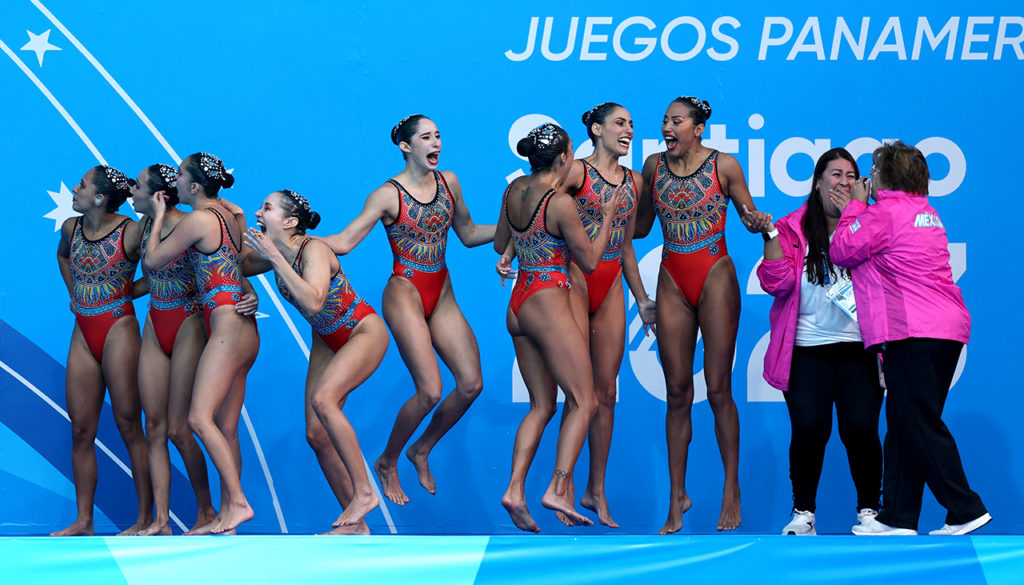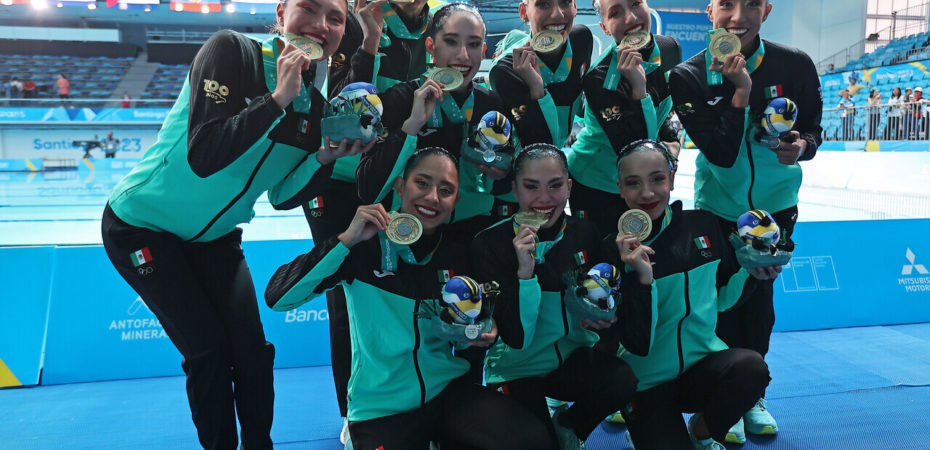Mexico made history at the 2023 Pan American Games by winning its first-ever gold medals in artistic swimming at this competition and securing Olympic berths to the 2024 Games in team and duet.
One team and one duet continental quota to the Olympic Games were up for grabs at this competition. With its victory in the team event, Mexico will be in Paris in both team and duet. Since the Mexican pair also won the Pan American Games duet gold, the continental duet quota goes to the USA, silver medalist and the next-best duet not already qualified.
The artistic swimming competition at the Pan American Games followed the same format as the Olympics, where only two medals were awarded for duet and team, based on combined scores.
Undoubtedly, all eyes were on the coveted top spot in team, which would guarantee a spot to the Olympics in both team and duet. Based on the past performances from this season, it seemed the fight for gold would be between the USA and Mexico.
The USA could be considered the favorites coming in, especially after winning bronze in technical team and silver in acrobatic team at the World Championships in July. Mexico placed sixth and fourth in these events, respectively. Of course, both teams had tremendously worked and strategized since.
On the first day of competition, Mexico immediately set the stage and opened the competition strong in the technical team. The Mexicans took the lead by over 13 points with their Queen’s “Don’t Stop Me Now” routine and a score of 267.5942.
The US had declared a massive DD of 41.60, which would have been the highest in the world if fully credited, for its Michael Jackson choreography. Unfortunately, the squad received a base mark on its second free hybrid and landed in second place with 253.8008.
The next day in the free team, the Mexicans continued their clean sweep with their “Monarch Butterfly” choreography, earning 290.2604 and a full DD of 47.000. For a very brief time with the meet still ongoing, they had placed ahead of the Americans. However, a successful appeal from the latter saw their own DD adjusted to 45.60, although still counting one base mark. In the end, the USA finished first in free team with a final score of 295.3667 for their “Water” choreography.
Although the Americans had closed the gap in the combined rankings, the Mexicans remained in the lead after two. Only about eight points now separated the two countries heading into the final event: the acrobatic team. Barring a disaster, both were essentially mathematically impossible to catch.
“With the appeal of the United States, we now saw ourselves only a very short distance ahead, but I told the team, ‘we will be there’,” said Nuria Diosdado, team captain and three-time Olympian in duet. “We went out with that strength, and seeing them so excited fills me with pride for the years I have been sharing with all of them.”
The final day was thrilling as all teams brought their A-games (for a basemark-less event!), but particularly both Mexico and the USA. The Americans took first place in the acrobatic team thanks to a score of 236.4233 and the highest DD of the field (23.05).
Swimming immediately after, the Mexicans had one of their best possible swims with their “Aztec” acrobatic routine. They scored 228.4000, which sufficed for second place in the event. But most importantly, it was just enough to stay in first place in the combined rankings by only 0.6638 points.
“We swam amazingly,” Jessica Sobrino said. “We couldn’t have done better. All the acros went perfectly, we are super satisfied.”
With a total score of 786.2546, Mexico clinched its first-ever gold medal in team at the Pan American Games, and the highly-coveted Olympic ticket. The last time the nation competed at the Olympic Games as a team was in 1996.
“We will not only go to the Olympic Games in duet, we will go as a team and we will make history for Mexico because our country has not been there since Atlanta,” said Joana Jimenez, Tokyo Olympian in duet. “I have already experienced an Olympic Games with Nuria, but these will be totally different. They will be unique because I am not only going with Nuria, I am going with my team.”

No matter the outcome of the team competition, Nuria Diosdado and Joana Jimenez had already secured Mexico a duet spot in Paris. Only the day before, the two won the first-ever gold for the country at the Pan American Games in artistic swimming.
The duet competition was less nerve-racking. On the first event of the entire competition, Diosdado and Jimenez, who competed together in Tokyo 2020, took the lead and scored 250.2333 in technical duet. Another strong outing in the free event helped them secure the gold by over 34 points, with a total score of 486.0208.
“I get goosebumps [remembering that moment],” Jimenez said. “I didn’t even look at the screen. Well I only looked to make sure we didn’t have base marks, but it was an indescribable emotion. I wanted to cry, I cried, I hugged Nuria, my coaches… I was very grateful for the opportunity to represent Mexico again here in this pool, to make history for our delegation, and what better way to give more satisfaction to all our Mexican people.”
Since Mexico’s team ended up qualifying, leading to the automatic qualification of its duet as well, the duet quota went down to Megumi Field and Ruby Remati of the USA silver medalists in Santiago.
In team and with a combined score of 785.5908, the Americans also won silver, their best finish at this competition since 2011. Additionally, 44-year-old Bill May, 2015 World Champion in mixed duet, became the first male artistic swimmer to win a medal at the Pan American Games.
Following the rule change last December allowing men to compete in team at the Olympic Games, all major international competitions have opened their doors to men in team routines.
Three more male artistic swimmers made history in Santiago by swimming alongside their respective teams: Andy Avila (Cuba), Nicolas Campos (Chile) and Gustavo Sanchez (Colombia). Campos, 15, and Sanchez, 23, actually swam across all three team routines. Moreover, and by luck of the draw, Sanchez was the very first male artistic swimmer to compete at the Pan American Games as Colombia was first up in the technical event.
The 2019 Pan American team champion Canada had to settle for bronze this time with a total of 662.0521. The nation also debuted a new duet of Audrey Lamothe, 18, and Olena Verbinska, 15. The two ranked fifth overall with a score of 361.2458.
While still showing some nerves, they are clearly a great fit and displayed a lot of potential. Undoubtedly, they should be ones to watch in the coming years as they get more time and competitive experience together.
Laura Miccuci and Gabriela Regly of Brazil won bronze in duet with a combined score of 390.2437. The two were actually in fourth place behind Colombia after the technical event, after receiving base marks and a score of 198.2833.
It was actually quite a close fight for the duet bronze between Colombia, Brazil and Canada heading into the free event. Ultimately, Brazil had the strongest swim of the three, receiving its full DD of 33.75 to make it to the podium.
Melissa Ceballos and Estefania Roa Bernal of Colombia ultimately finished fourth with a total of 372.5042, also displaying great potential for the future. This is a historical placement for the country at the Pan American Games.
Overall, the atmosphere was electric for Chile’s squad, who finished fifth in team and sixth in duet. This team is still quite young and has a bright future, continuously showing tremendous improvement from one competition to the next. 19-year-old twins Soledad Garcia and Trinidad Garcia handled the pressure beautifully, competing in duet for the first time this season on the senior international stage.
Unfortunately, Kyra Hoevertsz and Mikayla Morales of Aruba had to withdraw from the competition at the last minute as Hoevertsz was dealing with health issues.
The next and final opportunities to qualify to the 2024 Olympic Games in duet and team will be at the Doha World Championships in February.
ARTICLE BY CHRISTINA MARMET
Cover photo courtesy of Comité Olímpico Mexicano.
If you’ve enjoyed our coverage, please consider donating to Inside Synchro! Any amount helps us run the site and travel costs to cover meets during the season.

